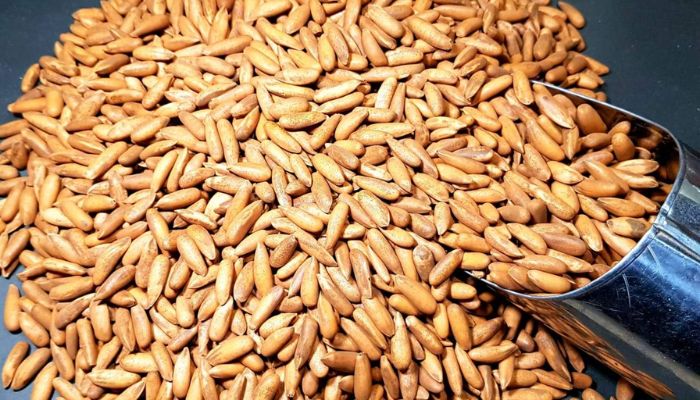Asfand Sandhela
ISLAMABAD: In the northern regions of the nation, the TRI Pakistan project is increasing the capacity for the local processing of chilgoza pine nuts. While preserving livelihoods, these actions are assisting in restoring these beloved forests.
Near the foot of the Himalayan mountains, Pakistan’s chilgoza pine forests cover the dry temperate forests. The trees produce a delectable nut that is prized for its creamy flavor and serves as a significant source of income for the surrounding communities. As a result of the explosive growth in both domestic and global demand for pine nuts in recent years, Pakistan is now the third-largest producer of pine nuts in the world, behind China and the Russian Federation.
Poor forest management threatens chilgoza pine nuts
The sustainability of Pakistan’s chilgoza forests, the production of chilgoza pine nuts, and local livelihoods are unfortunately threatened by this rising demand and poor forest management practices.
Unchecked unsustainable harvesting feeds a vicious cycle that prevents pine trees and other plant populations from naturally regenerating, or natural regeneration, as it is known. As a result, the entire forest ecosystem is impacted, and the local population is less able to rely on the forest as a source of fuel, food for grazing livestock, and other goods like medicinal plants, mushrooms, and honey.

Project to strengthen chilgoza pine nuts value chain
The TRI Pakistan project is strengthening the chilgoza pine nuts value chain in four districts: Chilas in the Gilgit Baltistan Region, Sherani in the Balochistan Province, and Chitral and South Waziristan in the Khyber Pakhtunkhwa Province. This is being done to address these issues while maintaining the well-being of local communities.
This updated value chain more accurately reflects the advantages of restoration while taking the negative effects of deforestation into account. Additionally, it encourages better management of these forests’ ecological and social importance.
The TRI Pakistan project, in collaboration with the Pakistan Forest Department, is promoting an integrated management approach that instructs and enforces science-based management practices, the use of sustainable harvesting techniques, and improved post-harvesting methods, all of which protect the rapidly declining population of healthy pine trees.
Harvesting sustainable amounts of chilgoza pine nuts
The 14 CFPCCs, where communities take an active part in assisting with local forest management, protection, and restoration, adopted policies in 2020 that laid the groundwork for the project’s success in 2021. The regulations established community monitoring and enforcement of rules with fines for violations, such as the collection of unripe cones, and banned large-scale commercial harvesting. They also set forth sustainable amounts of chilgoza pine cone harvesting within authorized seasons.
The TRI Pakistan project was able to establish two pine nut processing units in Sherani and Chitral in 2021, bringing the total number of units installed by the project since its inception to four, thanks to a framework of best practices and enforcement. The processing units make it possible to clean, grade, wash, dry, roast, and pack pine nuts more effectively, which extends their overall shelf life. Additionally, they increase community participation in chilgoza-related opportunities and trade, empower forest users, and create new employment opportunities, particularly for women.
Larger cut from the sale of chilgoza pine nuts for locals
In the end, communities are given long-term assurance regarding income and employment thanks to this self-sufficiency in the harvesting and post-harvesting processes, which also encourages better resource management and protection. In addition to helping the communities collect, roast, sort, and pack pine nuts sustainably, it increases their ability to directly access the national market. Direct access guarantees that locals receive a larger cut of the money made from pine nut sales than was previously possible.
A little under 60,000 kg of chilgoza pine nuts will be processed in 2021 thanks to the enthusiastic support received by the project’s four processing units. This production generates PKR 90 million (USD 513,000) across the districts, and the TRI Pakistan project now seeks to build four more units due to the strong demand. This acceptance demonstrates the potential for small-scale processing businesses to contribute more significantly to the growth of the nation’s economy.

Chilgoza pine nuts used to be gathered haphazardly
The TRI Pakistan project enhances chilgoza pine nuts management and collection, which supports natural regeneration in addition to enabling independent postprocessing. The chilgoza pine cones, which contain the pine nuts, were once haphazardly gathered. To make sure every single cone was collected, collectors would cut off entire branches from trees or, even worse, fell an entire tree.
This type of harvesting harms the tree, which makes natural regeneration more challenging, but it also has an effect on birds, pollinators, rare plants, and animals that depend on forests for food and shelter, such as the rare and endangered snow leopard (Panthera uncia), Himalayan lynx (Lynx lynx), and Kashmir markhor (Capra falconeri), also known as the screw-horned goat.
Decrease destructive chilgoza pine nut cone collection
In order to encourage less destructive cone collection at the earliest stages of the value chain, the TRI Pakistan project provided training and 300 harvesting toolkits in 2021. Each toolbox came with a top-notch cone pruner, a safety belt, a helmet, gloves, hard-toe boots, climbing spikes, cone pickers, and gum remover waxes. Having this equipment allows for easier cone removal, protecting trees and branches. Importantly, these kits make harvesting safer and have greatly decreased the number of casualties and injuries to people.
Harvesting chilgoza cones resulted in 26 injuries and 5 fatalities across all districts in 2018. Only three injuries and one fatality were reported in 2021. Providing farmers with cone-cracking equipment, distributing 1,000 fuel-efficient stoves, and distributing 200 gasifiers—cheap stoves that generate fuel from agricultural waste—were additional support measures. In 2022, it will be determined whether these stoves and gasifiers have had an effect on the demand for firewood sourced from the forest.
Infrastructure for chilgoza pine nuts collection needs government support
Even with these advancements, there are still a lot of unknowns that could jeopardize the progress made in enhancing the pine nut value chain and regenerating the Pakistani chilgoza pine forests. These uncertainties include a weak economy, scant technical information and research, poor marketing, and an unreliable market. Moving beyond small-scale processing will also require government assistance for upgraded infrastructure that reduces the burdens faced by farmers, equipment suppliers, and processors along the value chain.
Despite these uncertainties, the TRI Pakistan project is demonstrating how improving people’s well-being by promoting local livelihoods and offering a consistent, ongoing source of income stimulates interest in protecting and restoring priceless landscapes. The success of the project still depends heavily on local communities’ continued empowerment, which is also essential to preserving the ecosystems of the chilgoza pine nuts forests for future generations.
























